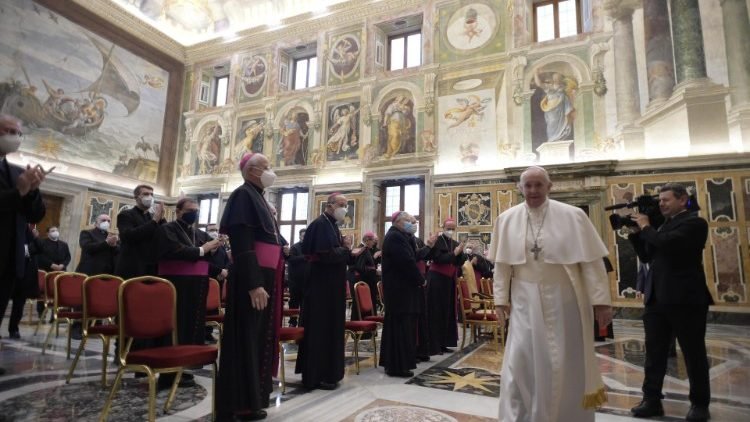Pope Francis welcomes members of Italy’s National Catechetical Office, inviting them to pray and think creatively about catechesis.
By Christopher Wells
Pope Francis called on catechists to “pray and think creatively about a catechesis centred on the kerygma, which looks to the future of our communities, so that they may be ever more rooted in the Gospel, communities that are fraternal, and inclusive.”
The Holy Father was speaking to members of the National Catechetical Office of the Italian Bishops’ Conference (CEI), which this year celebrates the 60th anniversary of its foundation. “This anniversary is a precious occasion for remembering, giving thanks for gifts received, and renewing the spirit of proclamation,” the Pope said, before offering several points of reflection “that I hope will help you in your work” in the coming years.
Catechesis and kerygma
First, Pope Francis emphasized the relationship between catechesis and kerygma, the proclamation of the Word of God. “Catechesis,” he said, “is the echo of the Word of God.”
At the heart of the kerygma is a Person, Jesus Christ; catechesis, therefore, “is a privileged space for a personal encounter with Him.” Catechesis, then, “must be interwoven with personal relationships.” Catechists are witnesses who have themselves encountered Jesus, and wish to lead others to encounter Him. He emphasized, too, that catechesis must be given in the language of the people, “in dialect, that is the language that comes from the heart.”
To do so, he said, we must remember elements of catechesis that are most needed to day: expressing God’s saving love, appealing to freedom, marked by joy. Similarly, this demands “certain attitudes” on the part of catechists, including approachability, openness to dialogue, patience, warmth, and welcome.
Catechesis and the future
The Pope’s second point had to do with catechesis and the future. In 2020, the church in Italy marked the 50th anniversary of the “renewal of catechesis” following the Second Vatican Council. “The catechesis inspired by the Council,” said Pope Francis, “is continually listening to the heart of the man, always with an attentive ear, always seeking to renew itself.”
Pope Francis insisted: “This is the Magisterium. The Council is the Magisterium of the Church. Either you are with the Church and therefore you follow the Council, or you interpret it in your own away, according to your desire, you do not stand with the Church.” He asked that there be no concessions “to those who try to present a catechesis that does not agree with the Magisterium of the Church.”
Like the Church in the post-conciliar period, so also today the Church is called to read “the signs of the times, “to offer a renewed catechesis that inspires every sphere of pastoral care.” Catechesis “is thus an extraordinary adventure,” the “vanguard of the Church,” which calls for “intelligence and courage to develop up-to-date tools that can transmit the richness and joy of the kerygma to people today.”
Catechesis and community
Finally, Pope Francis noted the importance of belonging to a community, especially in a year marked by isolation and a sense of loneliness. Community, he said, “is not an agglomeration of individuals, but the family into which we are integrated, the place where we take care of each other.”
Catechesis, therefore, and the proclamation of the kerygma, must have this communal dimension at its heart, the Pope said. He emphasized once more his desire that the Church be especially close to “the abandoned, the forgotten, the imperfect.” It is time, he said, “for communities that, like the Good Samaritan, know how to draw near to those wounded by life, to bind up their wounds with compassion.”



